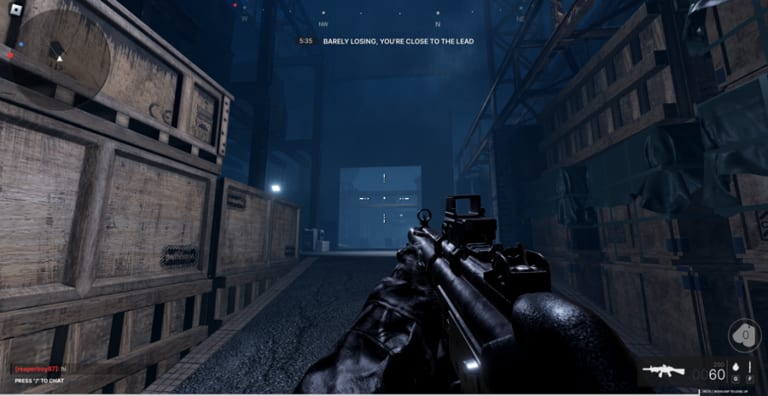Roblox as the Cloud Gaming Platform
Roblox has already built a successful gaming platform.

In this case, the platform enables developers do use their Creator Tools, specifically Roblox Studio, to build games. They bring 60M active daily users through their wide distribution on the player platforms (Mac, Android, PC for example) and thousands of games already available.
The world that they create is all internal to the Roblox experience. That carries both plusses and minuses.
On the plus side, people, particularly kids (maybe teenages, not sure about this) and their parents have an expectation of what is available and what is not. With age-appropriate filtering, it seems that games that are more suitable for teenagers wouldn't show up for younger kids (however, that definition is very wildly varying -- my kids have stumbled upon games which they bounced out of on their own because it was "inappropriate" -- usually scary.)
This large audience and increasingly powerful creator tools to attract more game development has made it into a powerful business engine, one that can take over the Metaverse (Why Roblox Beats Meta (Facebook) at the Metaverse).
However, there are different types of platforms.[1]
Roblox has a couple of models.
The marketplace
A marketplace is a two-sided platform of buyers and sellers. Airbnb and eBay illustrate the power and durability of these marketplaces once the chicken-and-egg problem has been solved.
Roblox has a robust ecosystem of the "sellers" -- who are creators of in-asset experiences that can be purchased with Robux -- and the "buyers" -- the players.
This marketplace dynamic can extend to the games themselves.
However, bunch the dynamic somewhat between two other kinds of platforms.
Content Platforms
A more traditional content platform is YouTube, which aggregates Creators. The Audience then comes to the Aggregation point, YouTube, to then interact with the content. As the Audience grows, so does the number of Creators, which attracts an Audience.
In this case, the Content is not just videos, but full-fledged games. But games are still a form of content -- in fact, probably one of the most influential and powerful forms of content.
Roblox's primary business in this regard is as a content platform.
However...there are also similarities to another kind of Platform
Compute Platforms
Traditional compute platforms appeal to developers, like the Apple AppStore or Microsoft Windows. These platforms attract users which attracts developers to build applications.
As Roblox makes the tools easier and easier, they become much more like a Content Platform.
However, the current platform shares similarities to compute platforms since the primary audience right now are developers.
Unlike pure compute platforms, however, the experience is tightly coupled. On Windows or the AppStore, there can be poker games and productivity apps aggregated together. Each can have wildly different personas, branding, experiences, and values.
Roblox is not currently a compute platform in that regard because the Roblox branded experience still matters. Even as games like Frontlines (see image below) break wildly from the expected experience, Roblox still needs to maintain some kind of branded experience given their primary audience:

For example, when I showed this to my two daughters, aged 9 and 11, they recoiled from the trailer! The trailer, alone, was a negative reaction for them. And while I know, as a result, they wouldn't likely play the game, it's showing some potential limits.
An AppStore experience is an aggregator, in the way that Steam aggregates games, but those experiences are completely independent from each other in terms of brand experience. Roblox isn't a neutral appstore, and I'm not sure if there's a benefit for it becoming so.
In this regard, it's not truly a Compute Platform, but it shares many of the same dynamics of serving developers and their audiences.
Interaction Network
Roblox doesn't seem to really have this, but the potential is there. Private servers seem to allow customized groups to socially interact on Roblox. And the limited chat allows some interaction.
My kids, for example, don't really go to Roblox to interact.
If they happen to get a notification that one of their friends is on the platform, then great: they teleport to each other and then do their thing.
That seems to be a powerful behavioral primitive that can grow, in the way that we saw Clubhouse spike.
Could it be the primary source of interacting the way messaging like WeChat and Facebook are?
I don't know. It's possible, but also out of my depth in terms of how the world is evolving in terms of social interactions online.
Technology Platforms
Typically platforms have power because they have flywheels within the ecosystem. More begets more.
There have also been powerful platforms that didn't have network defensibility or growth flywheels. These are technology platforms.
Technology platforms don't have as many in-built growth levers as these other examples do, but can we argue with the growth behind Amazon Web Services, Twilio, and Microsoft Azure? These cloud platforms enable businesses to build their own apps and services. Whether they have 1 or 1M users of their technology doesn't directly attract more users.
These examples illustrate how the business model behind the platform disrupted incumbents. In each case, hardware providers, data centers, and telcos were the incumbents disrupted by these cloud technology platforms.
I would argue that the three others that Roblox already has advantages in are preferable because they have built in growth mechanisms.
With their scale, is it possible they open another line of business that becomes highly profitable?
The Cloud Gaming Trend
We're seeing a move to cloud-native gaming. In the same way that SaaS ushered in a shift from client-server for business applications, cloud gaming will potentially offer high quality gaming over a mobile browser or Chrome book.
I don't know if we're there yet, but that seems to be fueling initiatives like Google's (now defunct) Stadia, Amazon's Luna, Nvidia's GeForce, and Epic's Cloud.
It's likely, however, that even fat client binaries that gamers download on their high powered PC's or dedicated gaming consoles are going to see shift to perhaps thin clients with more and more capabilities in the cloud.
Actually, as a non-gamer, I assumed that transition already happened till I felt like playing a Batman game and couldn't play it on the Mac.
With this trend, a cloud provider that enables rapid, high-quality games could join the fray. The compute layer might be at a higher level than the primitives offered by traditional clouds like AWS and Google, and need to be specific to game developers.
For example, Roblox could offer competitive offerings in a number of developer-facing services for game studios wanting to build games faster:
- physics engine
- avatar generation
- trust and safety
- image generation
- music generation
- currency management
- mapping and topology management
These are services that Roblox enables through their Studio for Roblox games developers.
Granted, many of these might be constrained within the Roblox branding guidelines, but with the example above from Frontlines, they can create games that don't have the traditional blocky design.
By providing these services, they could provide a marketplace, similar to how Salesforce has AppExchange and AWS has AWS Marketplace.
In fact, Roblox could also have a marketplace for augmented services, even those that compete with their own offerings. For example, if a content moderation service is popular, they could offer it to their developers.
The benefit of this approach is it abstracts the primitives from the final product, and this creates a new design space.
Dare I say it: it creates a true Metaverse platform?
Meaning, suppose a startup wanted to build a virtual workplace office. With these services, which they use and pay for as they would AWS, they could build and build more quickly.
Similarly, games that truly didn't fit within the Roblox brand could use the Technology Platform and pursue a different distribution and branding strategy.
Which use case would actually drive growth?
So let's work backwards. If we agree that more and more games will be delivered over the Cloud, and existing aggregators like Amazon, Nvidia, and Steam are likely to capture the lion's share, would this make sense for Roblox to open up their technology platform?
Maybe not.
On one hand, it is a closed ecosystem. If a developer truly wanted to capture the audience on Roblox, they'd have to vertically integrate: go all in on the developer tools as well.
Would they lose on other distribution channels?
I don't know.
I'm not familiar enough with the discovery pathways for different personas and segments so don't know, but the answer would depend on this.
For example, if a large genre is "Scary Chainsaw Massacre Games" and they are all used to going to Steam for this, does it benefit Roblox to still require those games be discovered in the Roblox Discovery panel?
I don't know.
More Questions
I think the first path actually would be to understand the Internal Developer experience (I'm going to a make educated guesses in the next article.)
But this won't really answer the questions, because the internal developer teams at Roblox are not building games!
They are building the tools and services to build games.
But the level beneath them, the infrastructure, is building the workflows and develop experience to build those services much faster.
Are those developer-focused primitives valuable in an external market?
I don't know.
If the Studio is basically an application which consumes those services, and that experience is better for developers, then there isn't any external value to opening these, right? The value should be fully unleashed by the developer facing tools.
So are there use cases where developers prefer the underlying primitives?
To me, at first pass, that use case is where the developers wants to build their alternative Studio because that Studio does not serve games!
Because if it served games, Studio should capture those since, as a product, that is the user case and persona -- game developers.
But let's say there were a company which felt there's a huge market in providing a Studio for future of work use cases. They could abstract the primitives into a workflow and workspace for their customers to build applications for workplace-focused developers.
So the question becomes, is the Studio robust enough to serve non-gaming use cases?
Concurrently, is the market for non-gaming Roblox-like experiences large enough to enable people to build a Studio around it?